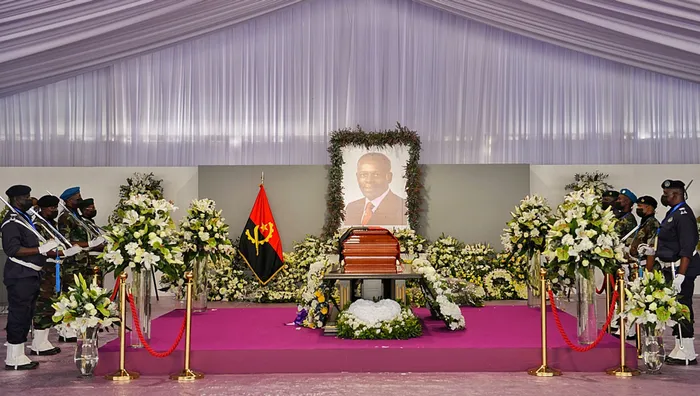Dos Santos laid to rest

Picture: Jairus Mmutle/GCIS – President Cyril Ramaphosa travelled to the Republic of Angola on Sunday to attend the state funeral service of former president of Angola Eduardo José Eduardo dos Santos.
By Chad Williams
Former president of Angola Eduardo José Eduardo dos Santos was finally laid to rest in his hometown after a funeral in the capital Luanda on Sunday.
The veteran politician died in Spain in July and his body arrived in Luanda at the weekend.
“The remains of Dos Santos arrived in Angola after a long waiting period,” Marcy Lopes, a government minister, told reporters shortly after the casket, draped in the Angolan flag, was taken off the aircraft.
The arrival in Angola of the remains of Dos Santos on August 20, just days before Angolans headed to the polls in crucial elections, ended a dispute that had lasted since July 8.
The body was finally handed over to his widow, Ana Paula dos Santos, after a legal battle between two sides of the family in the Spanish courts.
Lawyers representing Dos Santos’s daughter, Tchize dos Santos, had successfully requested a full autopsy, citing alleged “suspicious circumstances” around his death, without providing evidence, and had asked for him to be buried in Barcelona.
A Spanish judge ruled that the death was from natural causes, ruling out foul play, and allowed the release and repatriation of his body.
Critics of the ruling MPLA party worried that with a tight election, the party could seek to politicise the repatriation, diverting attention from the main opposition party Unita’s campaign and from the electoral process.
Dos Santos, who ruled Angola from 1979 to 2017, died on July 8, 2022, at the age of 79, in Barcelona, Spain, where he spent most of his time over the past five years.
President Cyril Ramaphosa travelled to the Republic of Angola on Sunday to attend the state funeral service of Dos Santos.
The state funeral service took place in Luanda at 11am South African time.
Ramaphosa was accompanied by Deputy Minister of International Relations and Co-operation Alvin Botes.
Several African leaders and Portugal’s president were in attendance.
Due to the presence of foreign leaders at the funeral, on what would have been Dos Santos’s 80th birthday, authorities asked local people not to protest amid tensions over the expected election result.
“The national police appeal to all citizens, civil society and organised groups that intend to organise activities on Saturday and Sunday to contain themselves out of respect for the former head of state,” local media quoted the Angolan police as saying.
Religious chants echoed through loudspeakers in the vast plaza, where there were black flags and posters paying homage to “Zedu” – Dos Santos’s nickname, according to Seychelles News Agency.
Local Angolan media said women wept, chanting the name of the man whose tenure was marred by allegations of sweeping nepotism and plunder of the oil-rich state’s resources.
The MPLA, the party that has ruled Angola continuously for nearly 50 years, claimed victory on Friday in this week’s election, after the electoral commission put its share of the vote at 51%. However, the leader of the main opposition coalition rejected the results, reports Reuters.
“The National Union for the Total Independence of Angola does not recognise the preliminary results published by the National Election Commission ... The Unita leadership calls on the National Election Commission, for the sake of truth, to agree to the creation of a commission with the participation of international observers to compare the consolidated protocols available to the commission with the final protocols of political parties,” Costa jr posted on social media.
General elections were held in Angola last week. The commission announced preliminary results after processing 97.03% of the ballots, according to which the ruling People’s Movement for the Liberation of Angola (MPLA) party won, securing 51.07% of the votes. In accordance with the Angolan law, the leader of the winning party, incumbent President Joao Lorenco, keeps the top office.
Williams is a multi-media journalist.
This article is original to the The African. To republish, see terms and conditions.